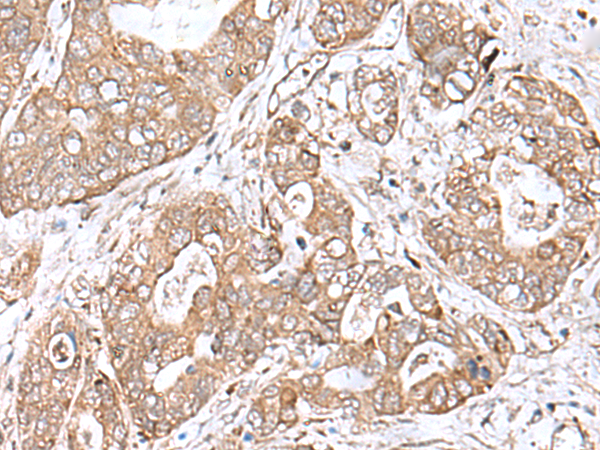
| WB | 咨询技术 | Human,Mouse,Rat |
| IF | 咨询技术 | Human,Mouse,Rat |
| IHC | 1/40-1/200 | Human,Mouse,Rat |
| ICC | 技术咨询 | Human,Mouse,Rat |
| FCM | 咨询技术 | Human,Mouse,Rat |
| Elisa | 1/5000-1/10000 | Human,Mouse,Rat |
| Aliases | ETF; TEF4; TEF-4; TEAD-2 |
| Host/Isotype | Rabbit IgG |
| Antibody Type | Primary antibody |
| Storage | Store at 4°C short term. Aliquot and store at -20°C long term. Avoid freeze/thaw cycles. |
| Species Reactivity | Human, Mouse |
| Immunogen | Fusion protein of human TEAD2 |
| Formulation | Purified antibody in PBS with 0.05% sodium azide and 50% glycerol. |
+ +
以下是关于TEAD2抗体的3篇参考文献及其简要概括:
1. **文献名称**:*"TEAD2 promotes cell proliferation and metastasis in colorectal cancer by regulating the Hippo signaling pathway"*
**作者**:Li Y, et al.
**摘要**:该研究利用TEAD2抗体通过免疫组化(IHC)和Western blot分析,发现TEAD2在结直肠癌中高表达,并通过调控Hippo通路促进肿瘤增殖和转移。
2. **文献名称**:*"The role of TEAD2 in embryonic development and neural differentiation"*
**作者**:Zhang H, et al.
**摘要**:通过TEAD2特异性抗体进行免疫荧光染色,研究发现TEAD2在小鼠胚胎发育中关键作用,尤其在神经分化阶段调控靶基因表达。
3. **文献名称**:*"TEAD2 as a novel biomarker in triple-negative breast cancer: Immunohistochemical analysis"*
**作者**:Wang J, et al.
**摘要**:使用TEAD2抗体对三阴性乳腺癌组织进行染色,发现TEAD2高表达与患者不良预后相关,提示其作为潜在治疗靶点的价值。
4. **文献名称**:*"Inhibition of TEAD2 enhances chemosensitivity in hepatocellular carcinoma via YAP signaling"*
**作者**:Chen L, et al.
**摘要**:通过TEAD2抗体阻断实验及ChIP分析,证实TEAD2通过YAP通路调控肝癌化疗耐药性,靶向TEAD2可提高化疗敏感性。
以上文献均涉及TEAD2抗体的实验应用(如Western blot、免疫组化等),聚焦于其在癌症或发育中的功能机制研究。
The TEAD2 antibody is a crucial tool for studying the TEAD family of transcription factors, which includes four members (TEAD1-4) involved in regulating genes essential for development, cell proliferation, and organ growth. TEAD proteins bind DNA via a conserved TEA domain and require co-activators like YAP/TAZ (Hippo pathway effectors) to modulate transcriptional activity. TEAD2. specifically, is implicated in embryonic development, stem cell maintenance, and cancer progression, with dysregulation linked to tumors such as glioblastoma and melanoma.
Antibodies targeting TEAD2 enable researchers to detect and quantify its expression, localization, and interactions in various experimental models. These antibodies are typically developed in immunized hosts (e.g., rabbits, mice) using immunogens derived from TEAD2-specific epitopes, often validated for applications like Western blotting, immunohistochemistry (IHC), immunofluorescence (IF), and chromatin immunoprecipitation (ChIP). Specificity is confirmed through knockout/knockdown controls or peptide blocking assays.
Commercial TEAD2 antibodies often include validation data (e.g., reactivity in human/mouse samples, molecular weight ~50 kDa) and are critical for exploring TEAD2’s role in Hippo signaling, cancer mechanisms, and regenerative medicine. Researchers prioritize antibodies with low cross-reactivity to other TEAD paralogs to ensure accurate results.
×